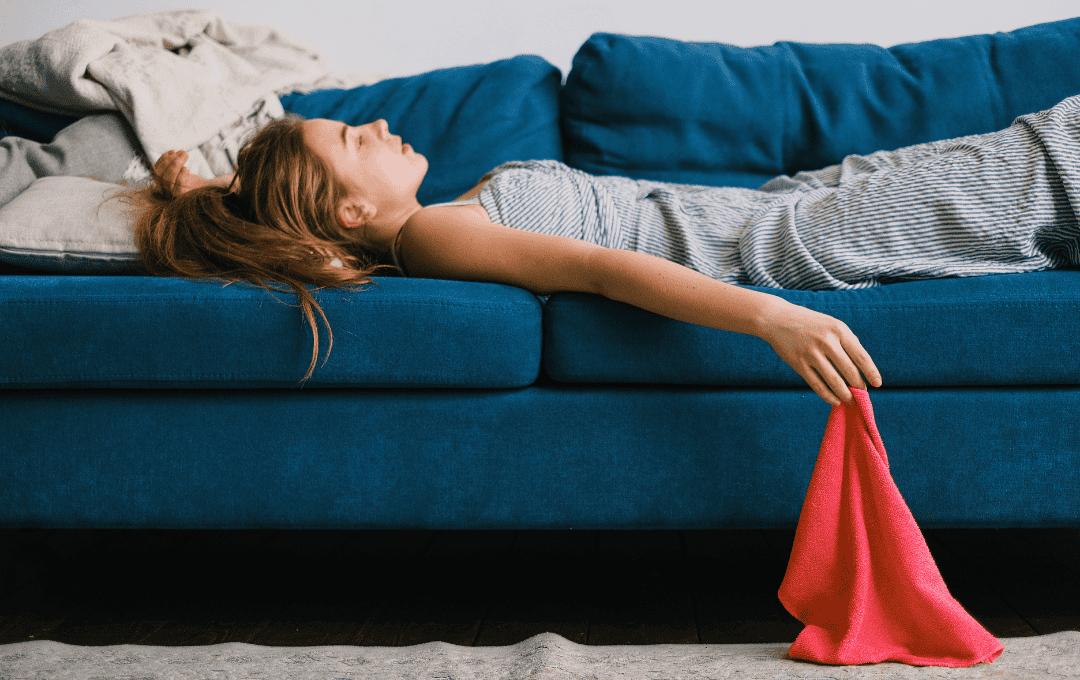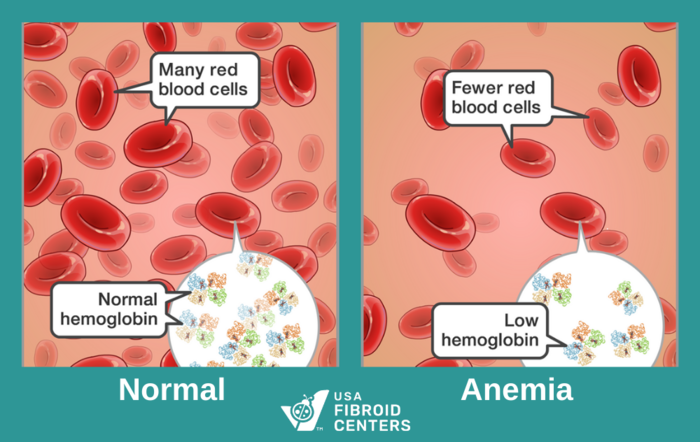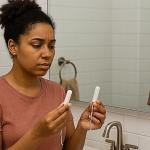
Anemia vs. Exhaustion
Everyone feels tired sometimes. Maybe you stayed up too late, skipped a meal, or pushed through a hectic day without a break. But what if your fatigue doesn’t go away—no matter how much you rest? That’s when it’s time to ask a bigger question: Is it just exhaustion, or is something more serious going on?
For women who experience heavy menstrual bleeding, period-related fatigue can feel overwhelming. If you’re constantly drained, foggy, or short of breath during your cycle, you may not be dealing with everyday tiredness. You could be showing signs of anemia. This is especially true if you have underlying conditions like uterine fibroids. Let’s determine how to know the difference.
What Is the Difference Between Anemia vs. Exhaustion?
Exhaustion is typically short term and often caused by lifestyle factors. A few nights of poor sleep, a high-stress week, or skipping meals can leave you wiped out, but in most cases, recovery comes with rest, proper nutrition, and time. Without enough oxygen, your body starts to slow down, and that fatigue can feel much heavier and harder to shake. This kind of deep tiredness won’t improve with sleep alone. That’s what makes anemia so hard to spot as it can look like everyday burnout, but it doesn’t behave the same way. There are some key differences when considering anemia vs. exhaustion.
Anemia is a medical condition in which you don’t have enough healthy red blood cells to carry adequate oxygen throughout the body. One potential cause of anemia is uterine fibroids, a type of non-cancerous growth that commonly develops in or on the uterus. Other fibroid symptoms include heavy menstrual bleeding, bleeding between cycles, severe cramps, lower back or leg pain, a protruding abdomen, frequent urination, low energy, and painful sex.
What Causes Anemia?
Anemia can happen for several reasons, but in women of reproductive age, heavy menstrual bleeding is one of the most common causes. If your periods are longer than seven days, or if you’re soaking through pads or tampons in less than two hours, you could be losing more blood than your body can replace. Over time, that blood loss can deplete your iron levels and reduce red blood cell production.
In some cases, the cause of heavy bleeding is a condition called uterine fibroids. These noncancerous growths in the uterus can lead to excessive or prolonged periods, increasing the risk of anemia.
What Does Anemia Fatigue Feel Like?
Anemia-related fatigue often creeps in slowly. You might notice you’re struggling to keep up with your normal routine. Walking up stairs, carrying groceries, or even concentrating at work feels harder than usual. Unlike regular tiredness, this type of fatigue tends to linger—and worsen.
You may feel physically weak, lightheaded, or experience a faster heartbeat doing simple tasks. Even after a full night’s sleep, you can wake up feeling completely depleted. Some women also describe a sense of heaviness in their arms and legs or a fog that doesn’t lift. This is your body telling you that it’s running low on oxygen and iron.
The reduced level of oxygen in the blood that results from anemia can cause a variety of undesirable and potentially problematic effects.
Symptoms of anemia include:
- Fatigue
- Weakness
- Pale or yellowish skin
- Irregular heartbeats
- Shortness of breath
- Dizziness or lightheadedness
- Chest pain
- Cold hands and feet
- Headaches
If you’re still not sure if your symptoms match, we’ve compiled some useful information about uterine fibroids, anemia, and exhaustion. The good news is that minimally invasive, outpatient fibroid treatment can help you gain control over fibroid-related anemia, along with alleviating other painful and inconvenient symptoms.
ANEMIA AND FIBROIDS: WHAT YOU NEED TO KNOW
When Exhaustion Is Actually a Symptom
Fatigue caused by anemia doesn’t always appear overnight. It can take weeks or months to build, making it easy to brush off as just a busy schedule or poor sleep habits. But if you find yourself relying on caffeine to get through the day, needing more naps, or struggling with breathlessness after mild activity, it may be time to consider a medical cause.
You may also experience related symptoms such as pale skin, headaches, or difficulty concentrating. These clues often point toward anemia, especially if they occur alongside menstrual issues.
Could Fibroids Be Behind Your Anemia?
Fibroids are more common than many people realize. In fact, up to 70% of women will develop fibroids by age 50. While not all fibroids cause symptoms, those that do often lead to heavy bleeding and pelvic pressure.
When fibroids trigger prolonged or intense menstrual cycles, the body can’t keep up with the amount of blood lost. This can lead to iron-deficiency anemia—one of the most common forms of anemia among women with fibroids. If you’re dealing with unexplained fatigue and heavy periods, this connection is worth exploring.
How Do Uterine Fibroids Cause Anemia?
We know that the more you bleed, the more red blood cells you lose. The most common symptom of uterine fibroids is heavy menstrual bleeding. In other words, blood loss from heavy periods caused by fibroids can lead to anemia.
How Can I Stop Feeling Tired From Fibroid-Related Anemia?
If you’re frustrated by constantly being tired due to fibroid-related anemia, you may be wondering what treatment options are available. Although you may wish to discuss the benefits of getting enough sleep, eating an iron-rich diet, and vitamin supplementation with your doctor, we also want you to know that only fibroid treatment can address the root cause of your fatigue: eliminating these common benign growths.
While many believe that a hysterectomy is their only available fibroid treatment, this isn’t true. At USA Fibroid Centers, we offer a minimally invasive, outpatient treatment called Uterine Fibroid Embolization (UFE). UFE can quickly shrink your fibroids and alleviate symptoms like heavy periods, severe cramps, low energy, and anemia. Our innovative, FDA-approved solution does not involve surgery, general anesthesia, a hospital stay, or a lengthy recovery period. Most women are back to their normal daily activities within only seven to 10 days.
Schedule a UFE Consultation With USA Fibroid Centers Today
If you are concerned about period exhaustion, anemia, and uterine fibroids, we encourage you to reach out to us for help. At USA Fibroid Centers, our leading fibroid specialists are available to evaluate your symptoms and make personalized treatment recommendations.
We usually recommend treatment if your fibroids cause you to miss work, cancel social engagements, avoid intimate situations, or experience low self-esteem. If your heavy periods lead to anemia-related fatigue, you may also be a good candidate for Uterine Fibroid Embolization.
When you are ready to set aside your anemia and exhaustion and take back control of your life, schedule an appointment with one of our experts to learn more about UFE. We provide state-of-the-art, non-surgical treatment in dozens of clinic locations nationwide. We look forward to helping you discover freedom from exhaustion, pain, and other symptoms.



